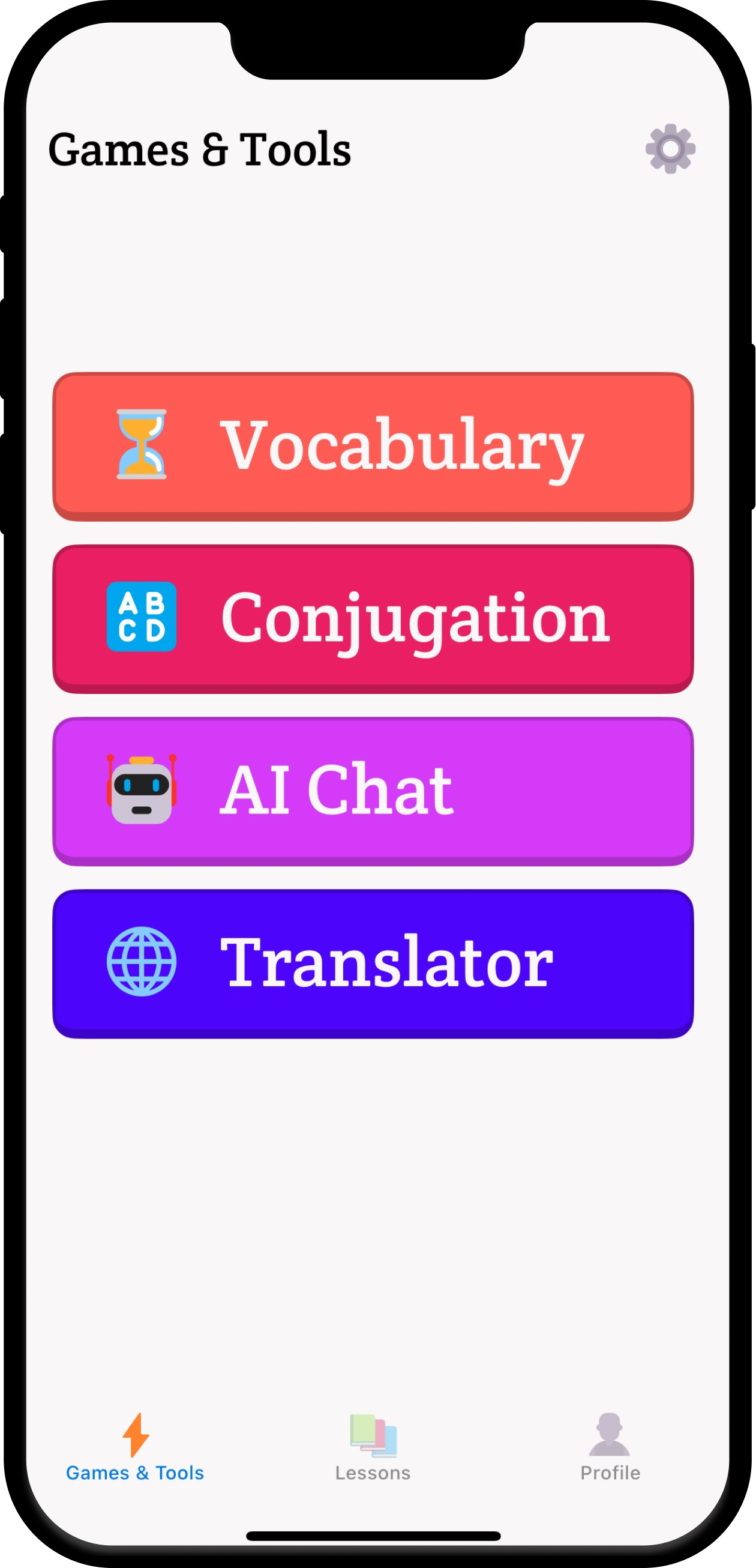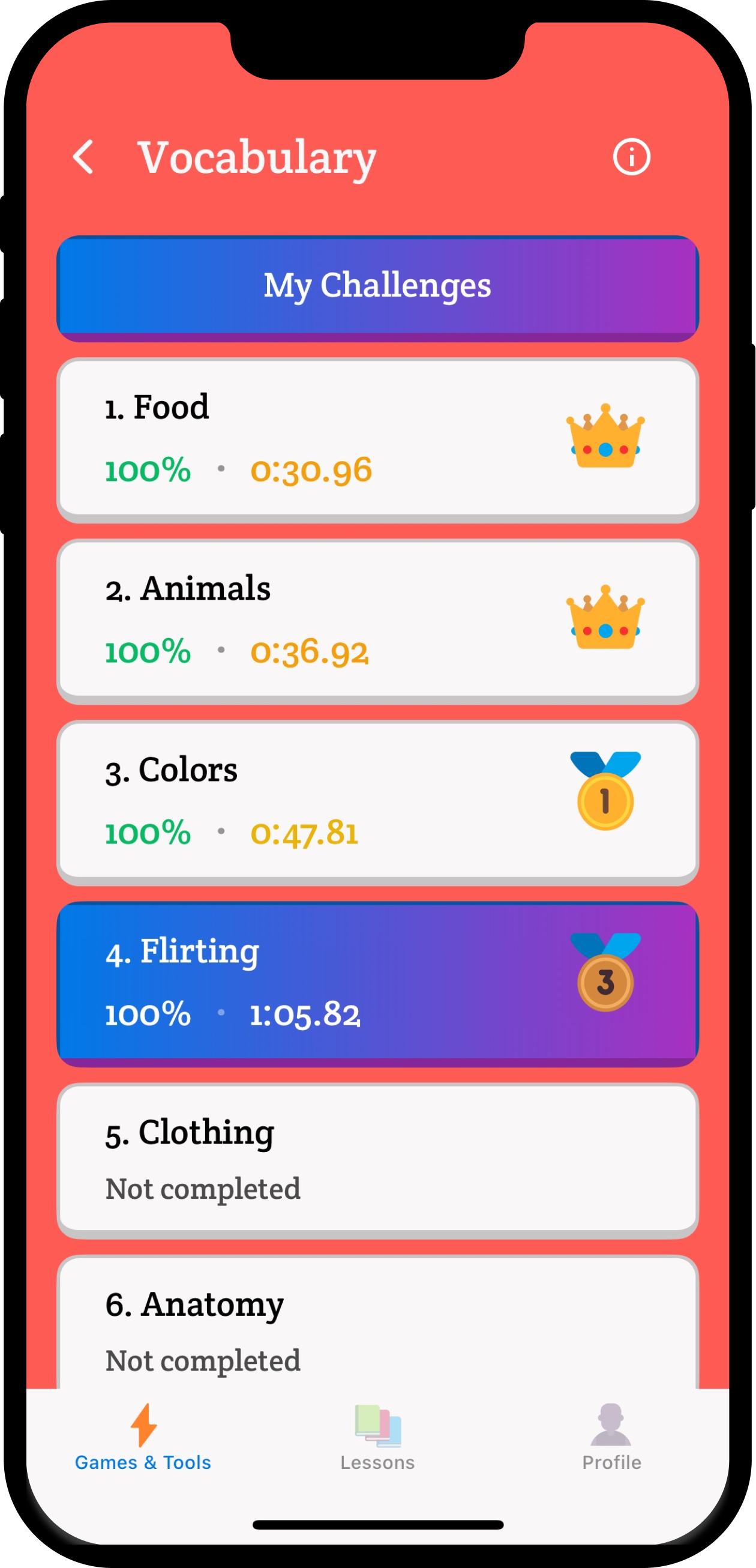100 German Slang Words and Expressions to Sound Like a Native

Table of Contents
- Everyday Casual Slang
- Regional Expressions
- Idioms & Sayings
- Youth Language
- Food & Drink Related
- Internet & Text Slang
- Friendly & Social Terms
- Interjections & Exclamations
- Informal Verbs
- Austrian & Swiss German Expressions
Ready to Learn More?
Try PolyChat's interactive language learning games and put your new vocabulary to the test!

Games & Tools
Essential tools for every learner

Timed Challenges
Practice vocabulary & conjugation

Interactive Games
Learn through engaging gameplay
Understanding German slang (Umgangssprache) is essential for natural communication with native speakers. While standard German (Hochdeutsch) is taught in language courses, everyday conversation is filled with colloquial expressions that can vary across regions and age groups. This guide introduces you to 100 essential German slang words and expressions that will help you sound more natural when speaking German.
Everyday Casual Slang
- Alter/Alte: Dude, man, buddy. Was geht, Alter? (What's up, dude?)
- Krass: Cool, awesome, extreme, intense (very versatile). Das ist ja krass! (That's awesome/intense!)
- Geil: Cool, awesome (literally "horny" but used for many positive things). Der Film war echt geil. (The movie was really awesome.)
- Keine Ahnung: No idea, dunno (very common). Keine Ahnung, was jetzt passiert. (No idea what happens now.)
- Na klar: Of course, sure. "Kommst du morgen?" "Na klar!" ("Are you coming tomorrow?" "Of course!")
- Quatsch: Nonsense, rubbish. So ein Quatsch! (What nonsense!)
- Kein Bock: No desire, can't be bothered. Ich hab kein Bock auf Arbeit. (I don't feel like working.)
- Ach so: Oh, I see (expressing understanding). "Es ist morgen frei." "Ach so!" ("Tomorrow is a day off." "Oh, I see!")
- Ding: Thing, stuff (like English). Gib mir mal das Ding da. (Give me that thing over there.)
- Labern: To talk nonsense, to babble. Laber nicht! (Stop talking nonsense!)
- Moin: Hello (used in northern Germany, especially Hamburg, all day). Moin moin! (Hi there!)
- Servus: Hello/Goodbye (used in southern Germany and Austria). Servus, wie geht's? (Hi, how are you?)
- Kumpel: Buddy, pal. Er ist mein alter Kumpel. (He's my old buddy.)
- Spitze: Great, excellent (literally "top"). Das war spitze! (That was great!)
- Es geht: It's okay, so-so (common response to "Wie geht's?"). "Wie geht's?" "Es geht." ("How are you?" "I'm okay.")
- Jein: Yes and no (combination of "ja" and "nein"). "Kommst du mit?" "Jein, ich muss erst was erledigen." ("Are you coming?" "Yes and no, I have to take care of something first.")
Regional Expressions
- Moin: Hello (Northern German). Moin moin, wie läuft's? (Hello, how's it going?)
- Grüß Gott: Hello (Southern German/Austrian greeting, literally "God greet you"). Grüß Gott, Herr Müller! (Hello, Mr. Müller!)
- Servus: Hello/Goodbye (Bavaria/Austria). Servus, bis später! (Bye, see you later!)
- Pfiat di: Goodbye (Bavarian, from "behüte dich Gott"). Pfiat di, bis morgen! (Goodbye, see you tomorrow!)
- Gude: Hello (Hessian). Gude, wie geht's? (Hello, how are you?)
- Hallöchen: Cute way to say hello (especially in Central Germany). Hallöchen, schön dich zu sehen! (Hello, nice to see you!)
- Schnacken: To chat, talk (Northern). Lass uns mal schnacken. (Let's have a chat.)
- Schmecken: To smell (instead of "to taste" in parts of southern Germany). Die Blumen schmecken gut. (The flowers smell good.)
- Broiler: Roast chicken (Eastern German). Heute gibt's Broiler zum Abendessen. (Today we're having roast chicken for dinner.)
- Bemme: Sandwich (Saxon dialect). Ich mach mir eine Bemme. (I'm making myself a sandwich.)
- Boulette: Meatball (Berlin dialect for "Frikadelle"). Ich hätte gerne zwei Bouletten. (I'd like to have two meatballs.)
Idioms & Sayings
- Ich verstehe nur Bahnhof: I don't understand a thing (literally "I only understand train station"). Er hat mir Quantenphysik erklärt, aber ich verstehe nur Bahnhof. (He explained quantum physics to me, but I don't understand a thing.)
- Das ist mir Wurst: I don't care (literally "that's sausage to me"). Ob wir um 8 oder 9 Uhr gehen, das ist mir Wurst. (Whether we go at 8 or 9 o'clock, I don't care.)
- Nicht alle Tassen im Schrank haben: To be crazy/not right in the head (literally "to not have all cups in the cupboard"). Der hat doch nicht alle Tassen im Schrank! (He's not right in the head!)
- Die Daumen drücken: To wish someone luck (literally "to press thumbs"). Ich drücke dir die Daumen für die Prüfung! (I'm keeping my fingers crossed for your exam!)
- Schwein haben: To be lucky (literally "to have pig"). Du hast echt Schwein gehabt! (You were really lucky!)
- Auf den Keks gehen: To annoy someone (literally "to go on someone's cookie"). Du gehst mir echt auf den Keks! (You're really annoying me!)
- Nicht die hellste Kerze auf der Torte sein: To not be very smart (literally "not the brightest candle on the cake"). Er ist nicht gerade die hellste Kerze auf der Torte. (He's not exactly the sharpest tool in the shed.)
- Da haben wir den Salat: Now we have a mess (literally "now we have the salad"). Jetzt ist das Auto kaputt. Da haben wir den Salat! (Now the car is broken. What a mess!)
- Die Katze im Sack kaufen: To buy something without checking it first (literally "to buy the cat in the bag"). Kauf nicht die Katze im Sack! (Don't buy a pig in a poke!)
- Tomaten auf den Augen haben: To not see what's obvious (literally "to have tomatoes on one's eyes"). Hast du Tomaten auf den Augen? Es steht direkt vor dir! (Are you blind? It's right in front of you!)
- Jetzt geht's um die Wurst: Now it's getting serious/critical (literally "now it's about the sausage"). Die letzte Runde, jetzt geht's um die Wurst! (The final round, now it's do or die!)
- Seinen Senf dazugeben: To add one's opinion when not asked (literally "to add one's mustard"). Er muss immer seinen Senf dazugeben. (He always has to put his two cents in.)
- Fix und fertig sein: To be completely exhausted (literally "to be fixed and finished"). Nach dem Marathon war ich fix und fertig. (After the marathon, I was completely exhausted.)
- Ins Fettnäpfchen treten: To put one's foot in it (literally "to step into the grease bowl"). Mit dieser Bemerkung bin ich voll ins Fettnäpfchen getreten. (With that remark, I really put my foot in it.)
Youth Language
- Digga/Diggah: Dude, bro (very common among youth). Digga, was geht ab? (Dude, what's up?)
- Chillen: To relax, hang out. Wir chillen heute am See. (We're chilling at the lake today.)
- Babo: Boss, chief (from Turkish). Er denkt, er ist der Babo. (He thinks he's the boss.)
- Yolo: You only live once (used in German too). Lass uns feiern gehen, Yolo! (Let's go party, Yolo!)
- Abfeiern: To celebrate, to enjoy. Ich hab den Film total abgefeiert. (I really enjoyed the movie.)
- Keinen Bock haben: To not feel like doing something. Ich hab keinen Bock auf Schule. (I don't feel like going to school.)
- Alman: Stereotypically German (slightly derogatory). Das ist so Alman von dir. (That's so stereotypically German of you.)
- Vallah: I swear (from Arabic, very common in youth language). Vallah, das stimmt! (I swear, that's true!)
- Geht fit: It's all good. "Wie läuft's?" "Geht fit!" ("How's it going?" "All good!")
- Auf keinsten: No way (stronger than "auf keinen Fall"). Auf keinsten gehe ich dahin! (No way I'm going there!)
- Ehrenmann/Ehrenfrau: Honorable person (someone who does something nice). Danke für die Hilfe, du bist ein Ehrenmann! (Thanks for the help, you're a man of honor!)
- Läuft bei dir: Good for you, you're doing well. Neues Auto? Läuft bei dir! (New car? You're doing well!)
- Cringe: Embarrassing, awkward (borrowed from English). Der Tanz von Papa war so cringe. (Dad's dance was so cringe.)
- Wyld/Wild: Crazy, intense (from English "wild"). Diese Party gestern war wyld! (That party yesterday was crazy!)
Food & Drink Related
- Bierchen: Small beer (diminutive, sounds friendlier). Ein Bierchen nach der Arbeit? (A beer after work?)
- Kaffee trinken gehen: To meet for coffee (more of a social event than just drinking coffee). Wollen wir Kaffee trinken gehen? (Shall we go for coffee?)
- Absacker: Last drink of the evening. Noch einen Absacker und dann gehen wir. (One last drink and then we'll go.)
- Stulle: Sandwich (particularly in Berlin). Ich hab mir eine Stulle mit Käse gemacht. (I made myself a cheese sandwich.)
- Mampf: Food, snack (informal). Hast du Mampf dabei? (Did you bring any food?)
- Futtern: To eat (casual). Lass uns was futtern gehen. (Let's go eat something.)
- Lecker: Tasty, delicious (can be used as exclamation). Das schmeckt lecker! (This tastes delicious!)
- Einen heben: To have a drink (literally "to lift one"). Gehen wir einen heben? (Shall we go for a drink?)
- Wegbier: Beer for on the go (literally "away beer"). Ich hol mir noch ein Wegbier für den Heimweg. (I'll get a beer to drink on my way home.)
- Jause: Snack, light meal (Southern German, Austrian). Wir machen eine kleine Jause. (We're having a small snack.)
Internet & Text Slang
- LOL: Same as English, laugh out loud. Das war so lustig, LOL. (That was so funny, LOL.)
- Wegen dem: Because of (grammatically incorrect but common in casual texts). Wegen dem Regen bleibe ich zu Hause. (Because of the rain, I'm staying home.)
- btw: By the way (used in German too). Ich komme morgen, btw hast du Tina gesehen? (I'm coming tomorrow, btw have you seen Tina?)
- hdl: Hab dich lieb (love you, but for friends/family, not romantic). Danke für deine Hilfe, hdl! (Thanks for your help, love you!)
- kA: Keine Ahnung (no idea). "Wann kommt der Film raus?" "kA." ("When is the movie coming out?" "No idea.")
- kP: Kein Plan (no plan/no idea). "Was machen wir am Wochenende?" "kP." ("What are we doing this weekend?" "No idea.")
- eig: Eigentlich (actually). Eig wollte ich heute joggen gehen. (Actually, I wanted to go jogging today.)
- vllt: Vielleicht (maybe). Kommst du vllt morgen? (Are you maybe coming tomorrow?)
- OMG: Oh mein Gott (Oh my God). OMG, hast du das gesehen? (OMG, did you see that?)
Friendly & Social Terms
- Alter Schwede: Expression of surprise (literally "old Swede"). Alter Schwede, das war knapp! (Wow, that was close!)
- Mach's gut: Take care (common goodbye). Mach's gut, bis bald! (Take care, see you soon!)
- Läuft: It works, it's going well. "Wie ist dein neuer Job?" "Läuft!" ("How's your new job?" "It's going well!")
- Schatz: Darling, honey (common term of endearment). Guten Morgen, Schatz! (Good morning, darling!)
- Mahlzeit: Said at lunchtime (literally "meal time"). Mahlzeit, guten Appetit! (Hello there, enjoy your meal!)
- Hau rein: Go for it/Bye (literally "hit into it"). Hau rein, bis morgen! (Take care, see you tomorrow!)
- Pass auf dich auf: Take care of yourself. Pass auf dich auf, bis bald! (Take care of yourself, see you soon!)
- Sehr gut drauf sein: To be in a good mood. Sie ist heute sehr gut drauf. (She's in a very good mood today.)
- Passt schon: It's fine, no problem. "Tut mir leid für die Verspätung." "Passt schon." ("Sorry for being late." "It's fine.")
- Bis die Tage: See you in the coming days (casual goodbye). Bis die Tage, wir telefonieren! (See you soon, we'll talk on the phone!)
Interjections & Exclamations
- Ach du meine Güte: Oh my goodness. Ach du meine Güte, was ist hier passiert? (Oh my goodness, what happened here?)
- Mensch!: Man! (Expressing surprise or emphasis). Mensch, das ist ja toll! (Man, that's great!)
- Boah!: Wow! Boah, hast du das gesehen? (Wow, did you see that?)
- Na und?: So what? "Ich mag deine Jacke nicht." "Na und?" ("I don't like your jacket." "So what?")
- Hä?: Huh? (Expressing confusion). Hä? Was meinst du damit? (Huh? What do you mean by that?)
- Ach was!: No way! (Expressing disbelief). "Ich habe im Lotto gewonnen." "Ach was!" ("I won the lottery." "No way!")
- Ups!: Oops! Ups, das wollte ich nicht machen. (Oops, I didn't mean to do that.)
- Och nö!: Oh no! Och nö, nicht schon wieder! (Oh no, not again!)
- Naja: Well... (expressing hesitation or reservation). "War der Film gut?" "Naja..." ("Was the movie good?" "Well...")
- Donnerwetter!: My goodness! (literally "thunder weather"). Donnerwetter, das ist aber ein schönes Auto! (My goodness, that's a beautiful car!)
Informal Verbs
- Schnappen: To grab. Schnapp dir eine Jacke! (Grab yourself a jacket!)
- Kapieren: To understand, get it. Jetzt kapiere ich das endlich. (Now I finally get it.)
- Pennen: To sleep (casual). Ich bin gestern früh gepennt. (I went to sleep early yesterday.)
- Reinhauen: To eat quickly. Er hat sich die Pizza reingehauen. (He wolfed down the pizza.)
- Spucken: To spit, but also used as "to talk". Spuck's aus! (Spit it out! / Say it!)
- Abhauen: To leave, run away. Lass uns abhauen. (Let's get out of here.)
- Quatschen: To chat. Wir haben stundenlang gequatscht. (We chatted for hours.)
- Klauen: To steal. Jemand hat mein Fahrrad geklaut. (Someone stole my bike.)
- Kriegen: To get (very common instead of "bekommen"). Kriegst du das hin? (Can you manage that?)
- Zocken: To play video games, to gamble. Wir haben die ganze Nacht gezockt. (We played video games all night.)
Austrian & Swiss German Expressions
- Grüezi: Hello (Swiss German). Grüezi, wie geht es Ihnen? (Hello, how are you?)
- Servus: Hello/Goodbye (Austrian). Servus, schön dich zu sehen! (Hi, nice to see you!)
- Oida: Dude (Austrian, can express many emotions). Oida, was geht? (Dude, what's up?)
- Mahlzeit: Enjoy your meal (Austrian). Mahlzeit! Lass es dir schmecken. (Enjoy your meal!)
- Sali: Hello (Swiss German). Sali zäme! (Hello everyone!)
- Baba: Goodbye (Austrian). Baba, bis morgen! (Bye, see you tomorrow!)
- Gern gschehen: You're welcome (Austrian). "Danke!" "Gern gschehen!" ("Thanks!" "You're welcome!")
- Hoi: Hello (Swiss German). Hoi, wie geht's? (Hi, how are you?)
- Pfiat di: Goodbye (Austrian, from "behüte dich Gott"). Pfiat di, schönen Tag noch! (Goodbye, have a nice day!)
- Grüessech: Hello (Swiss German, formal). Grüessech, kann ich Ihnen helfen? (Hello, can I help you?)
Learn Other Languages from German with PolyChat
Are you a German speaker looking to learn other languages? PolyChat is the perfect app for you! As a German speaker, you have unique advantages when learning certain languages, and PolyChat leverages these connections to accelerate your language learning journey.
Why German Speakers Excel at Learning These Languages:
🇳🇱 Dutch - Germanic cousin! German and Dutch share 60%+ vocabulary and similar grammatical structures.
🇬🇧 English - Germanic sibling with thousands of shared words and familiar concepts.
🇳🇴 Norwegian/🇩🇰 Danish/🇸🇪 Swedish - North Germanic cousins with shared Germanic roots.
🇵🇱 Polish - Historical neighbor with many German loanwords already familiar to you.
🇨🇿 Czech - Central European neighbor with shared cultural and linguistic influences.
PolyChat's Advantage for German Speakers:
✅ Germanic Language Bridge - Master Dutch, English, and Scandinavian languages using your German foundation ✅ Central European Network - Connect with Polish, Czech, and other neighbors through shared vocabulary ✅ Global Communication - Use your systematic language learning skills for Spanish, French, Italian ✅ Worldwide Reach - Connect with 1.5+ billion English speakers and millions of Dutch speakers
Ready to expand across Europe and beyond? Download PolyChat today and discover how your German language skills can unlock a world of new languages!
PolyChat - The best app to learn languages from German 🇩🇪→🌍
This list gives you a solid foundation for understanding German slang! Remember that slang evolves quickly and varies significantly across different regions, age groups, and social contexts. The best way to learn is through immersion - watching German movies, listening to music, and conversing with native speakers.
Related Posts
100 Palabras y Expresiones de Jerga Inglesa
Una guía completa de la jerga inglesa, incluyendo falsos amigos, modismos y expresiones que suelen causar confusión.
Read more100 Spanish Slang Words You Need to Know
Learn the most common Spanish slang words and phrases that will help you sound like a native speaker in everyday conversations.
Read more100 French Slang Words and Expressions You Should Know
Discover essential French slang words and expressions that will help you sound more natural and understand everyday conversations with native speakers.
Read more